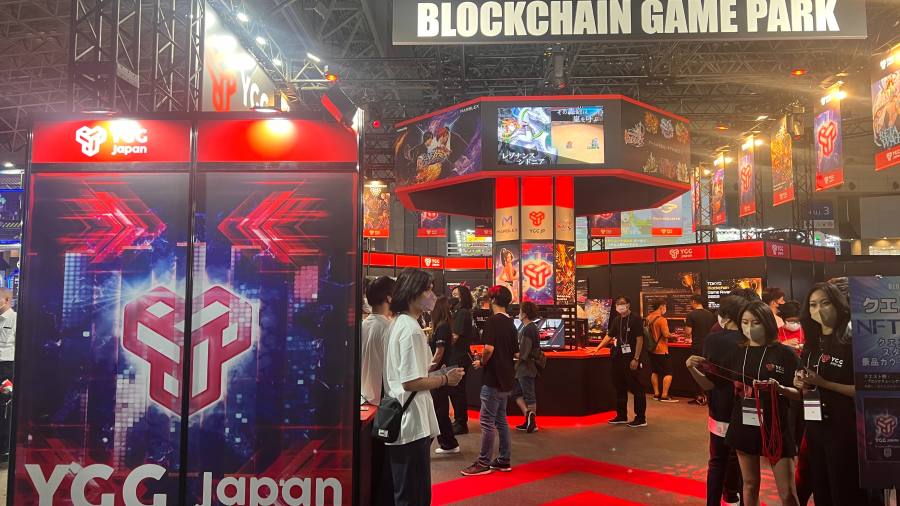
In a sign of the fast-changing times since the Tokyo Game Show was last physically staged in 2019, one of the biggest stands at this week’s convention is occupied by a loan provider — for players of blockchain games.
The Philippines-based company Yield Guild Games (YGG) is Asia’s biggest provider of start-up loans for people hoping to earn a living from the new genre. It chose the show to launch a global marketing drive to convince the industry, governments and the public that crypto-linked games are not “dodgy”.
The Tokyo Game Show in Chiba, one of the main gatherings for the global video games industry, has twice been cancelled by the pandemic. During its hiatus, blockchain gaming has become a new growth sector.
Video games have long incorporated their own in-game currencies, but the new cryptocurrency-based titles allow players to convert the assets they win into real cash through officially sanctioned channels.
The high entry fees to the games have prompted the emergence of companies like YGG, which supplies starting capital to people who plan to devote themselves to earning money from gaming.
Part of the mission of YGG Japan and its local partner ForN is to convince a sceptical industry and public that blockchain gaming is, in addition to being lucrative, just as much about having fun.
“People think it’s very dodgy that they make money playing games and some even suspect these might be financial scams, but we want to change this image,” said ForN marketing head Sho Miyashita.
“So, instead of a global slogan of ‘play to earn,’ we are promoting a concept of ‘play and earn’: we want people to first enjoy games, and have an earning experience after,” he added.
In other countries, such as the Philippines during the pandemic, players have quit their real jobs believing they can earn enough money from battling digital monsters in games like Axie Infinity, developed by the Vietnamese studio Sky Mavis.
To get started, Axie required a $1,000 entry fee and YGG became an early sponsor of Axie players in the Philippines and investor in the game’s tokens. It offers “scholarships” to finance users, taking a share of their earnings in exchange.
Blockchain games have been slower to catch on in Japan, said Miyashita, partly because of strict regulations whereby foreign blockchain game publishers need to register their tokens on Japanese exchanges to sell games in the country.
An even bigger factor was their image problem, he acknowledged.
“Many players of these games today are speculators . . . The blockchain game industry will fade out in the next couple of years unless Japan, which is said to have a 40mn gaming population, mass-adopts these games and finds them simply interesting as games,” said Miyashita.
Digital Entertainment Asset (DEA), a blockchain game publisher on another booth at the show, said its products could provide financial support in other ways.
In one example, Belgian football club KMSK Deinze has bought non-fungible tokens (NFTs) for DEA game items using funds from its sponsors. It has lent them out to fans, who can earn money playing the games and use it to buy items from the club shop, as well as match tickets and even a seat on a bus to an away fixture.
“This shows that blockchain games provide a new option to a professional sports club to earn money, other than broadcasting rights,” said Kozo Yamada, founder of DEA. “Games are no more about those who develop and play games. A surrounding economic zone can be much enlarged.”
Konami, one of Japan’s biggest traditional games publishers, is also looking to get in on the act. Ken Kanetomo, who oversees its blockchain business, said he believed the technology would “expand exponentially” the value that games could deliver.
The publisher behind conventional hits such as Castlevania and Silent Hill has yet to give a date for its own blockchain game launch and is also struggling with the balance of making enjoyable games while allowing players to cash in on the trend.
“If the world’s understanding of blockchain does not catch up, it will be perceived as a game to make money, which is not our intention,” Kanetomo said.

